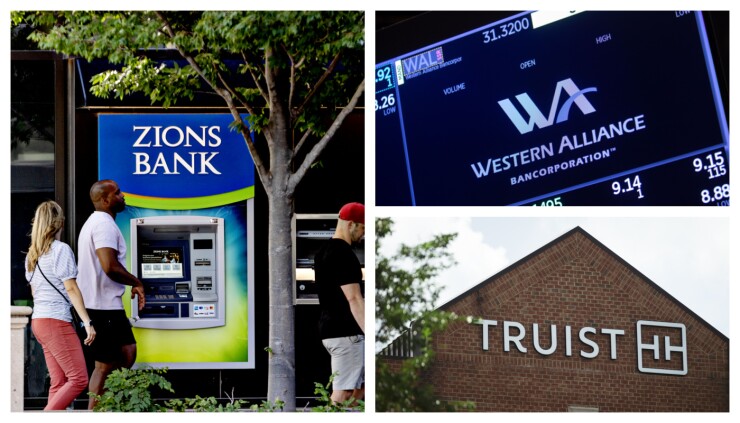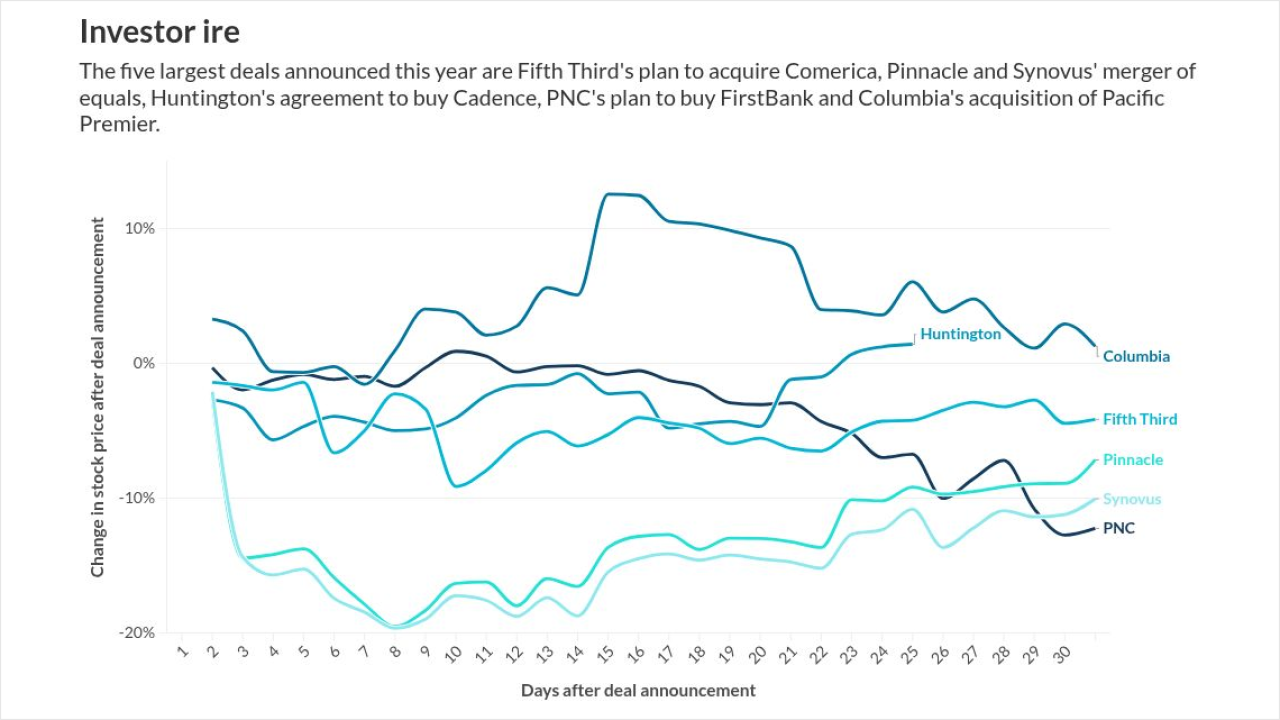- Key insight: Regional bank CEOs on Friday sought to ease the concerns of investors who've grown jittery about banks' credit quality after the disclosure of certain issues related to allegedly fraudulent loans.
- What's at stake: One bank CEO said the recent credit problems are "uncorrelated events."
- Supporting data: The KBW Nasdaq Regional Banking Index stabilized on Friday after falling some 7% at times during the prior day.
Amid market turmoil that roiled bank stocks this week, regional bank CEOs are trying to allay fears that the sector is on the brink of a credit crisis spurred by alleged loan fraud.
On Friday, bankers defended the credit quality of their portfolios and their underwriting processes following a day that saw some bank stocks fall more than 10%.
"We have seen in the market some … idiosyncratic and uncorrelated events," Truist Financial Chairman and CEO Bill Rogers told analysts during the bank's third-quarter earnings call. "That being said … the No. 1 risk for a bank is credit risk, and we're vigilant about that. We have been in the past. We're hyper-vigilant today. And we'll be hyper-vigilant tomorrow."
The industry's issues started when a handful of banks logged credit hits in connection with Tricolor Holdings, a subprime auto lender accused of fraud that filed for bankruptcy last month. Weeks later, First Brands Group, a U.S. maker of auto parts such as oil filters and windshield wipers, filed for bankruptcy, also amid allegations of defrauding financial institutions.
And then this week, a third credit blunder tied to allegedly fraudulent borrowers tipped the scales. Two banks — Zions Bancorp. in Salt Lake City and Western Alliance Bancorp. in Phoenix — said they were suing three connected investment entities. Both banks' stock prices plunged Thursday as the market grew jittery over the exposures.
The ostensibly coincidental snafus put the market on watch. Even before the disclosures from Zions and Western Alliance, JPMorganChase CEO Jamie Dimon made a comment about fraud on Tuesday that haunted banks for the rest of the week: "When you see one cockroach, there are probably more."
Compounding fears about credit quality, the recently disclosed woes involve a rapidly growing, yet largely opaque line of business — non-depository financial institution, or NDFI, lending.
The sector — which includes a range of bank activities like working capital loans to insurance companies, private capital financing and warehouse business — has exploded as a lever for loan growth in recent years. It now makes up about 10% of all U.S. bank loans.
Banks and analysts alike have bemoaned the sector's confusing reporting system and often-complicated loan structures. Fifth Third Bancorp CEO Tim Spence said in an interview Friday that the best thing banks can do is provide more clarity around the breakout of their activity in the sector.
"When you have a couple of [credit issues] pop up and they live inside the same category, and it's a category that's been difficult for investors to get their heads around, the immediate reaction is going to be concern," he said.
So far, the data seems to back up banks' general confidence about their credit compositions. Analysts were comfortable with the majority of the credit metrics that lenders reported this week. Many banks reported improvements in criticized loans and nonperforming assets.
Even some companies that got caught in the latest credit drama, like Cincinnati-based Fifth Third, logged lower amounts of nonperforming loans in the third quarter.
Michael Driscoll, an analyst at Morningstar DBRS, said in a research note Friday that banks are well positioned to absorb losses, even if their asset quality faces pressure from inflation, tariff uncertainty and geopolitical risks. The latest loan problems have sparked fears for broader deterioration because losses have recently been low, he added.
"One of the lessons from 2023 regional bank failures was that banks' funding can unravel faster than in the past if sizable issues emerge," Driscoll wrote.
On Friday, the KBW Nasdaq Regional Banking Index, which tracks 24 large and regional U.S. banks, had stabilized, after sliding by some 7% at different times the day before in what RBC Capital Markets analyst Jon Arfstrom called "a bloodbath."
How it started
Fifth Third seemed to catalyze the credit concerns last month when it disclosed it would take a $200 million hit in the third quarter related to Tricolor.
A handful of other lenders also announced Tricolor-related blows, ranging from around $20 million at several community banks to $170 million at JPMorgan.
Fifth Third conducted a "comprehensive" review of its asset-backed finance portfolio and is confident about its asset quality in the rest of that category, Chief Credit Officer Greg Schroeck said on the company's Friday earnings call. The bank aims for diversification in its NDFI portfolio and it will begin to implement practices to enhance and reinforce "some of the ongoing monitoring that needs to take place in that space," Schroeck said.
First Brands' Chapter 11 filing a few weeks later revealed debts of more than $10 billion, including money owed to the investment bank Jefferies Financial Group.
On Friday, Truist said it has "less than $200 million" in exposure to the bankrupt auto parts maker. Asked for details on Truist's relationship with First Brands, Chief Risk Officer Brad Bender responded: "It would be early for us to get into the details of that."
Fifth Third was previously a lender for First Brands, but "exited" the relationship "a handful of years ago because of some issues that were identified during the collateral reviews we were doing," Spence said.
Fifth Third's residual exposure is $51,000 of operating leases backed by a forklift and a printer, according to Spence.
The CEO told American Banker that Fifth Third saw irregularities in the collateral associated with the First Brands accounts receivable facilities, but he declined to offer more details about what the bank found.
Like Truist, U.S. Bancorp also has exposure to First Brands, it said during its third-quarter earnings call earlier this week. But CEO Gunjan Kedia brushed off the idea of changing the $695 billion-asset company's underwriting processes.
"I don't think we'll do anything different," Kedia said on the earnings call. "We have very, very strong underwriting capabilities and when you have a large book, you have one or two issues. You have to be very appropriately reserved for it, which we are."
Zions and Western Alliance disclosed their exposures to three related entities on Wednesday and Thursday. Both banks said in securities filings that they are alleging fraud through lawsuits.
Zions, which is seeking to recover $60 million, said that it had taken a credit provision for that amount, including a $50 million charge-off.
Western Alliance filed its suit in August to recover $100 million.
Brandon Tran, a lawyer representing the defendants, said in an email to American Banker that his clients "vehemently deny all the allegations of wrongdoing," calling the claims "unfounded."
At Webster Financial in Stamford, Connecticut, CEO John Ciulla also faced questions Friday about fraud exposures. He said the $83.2 billion-asset company has no credits related to the recently publicized cases, and defended the bank's underwriting processes.
"We're very confident that the underwriting we have in there is extremely solid," Ciulla said.






